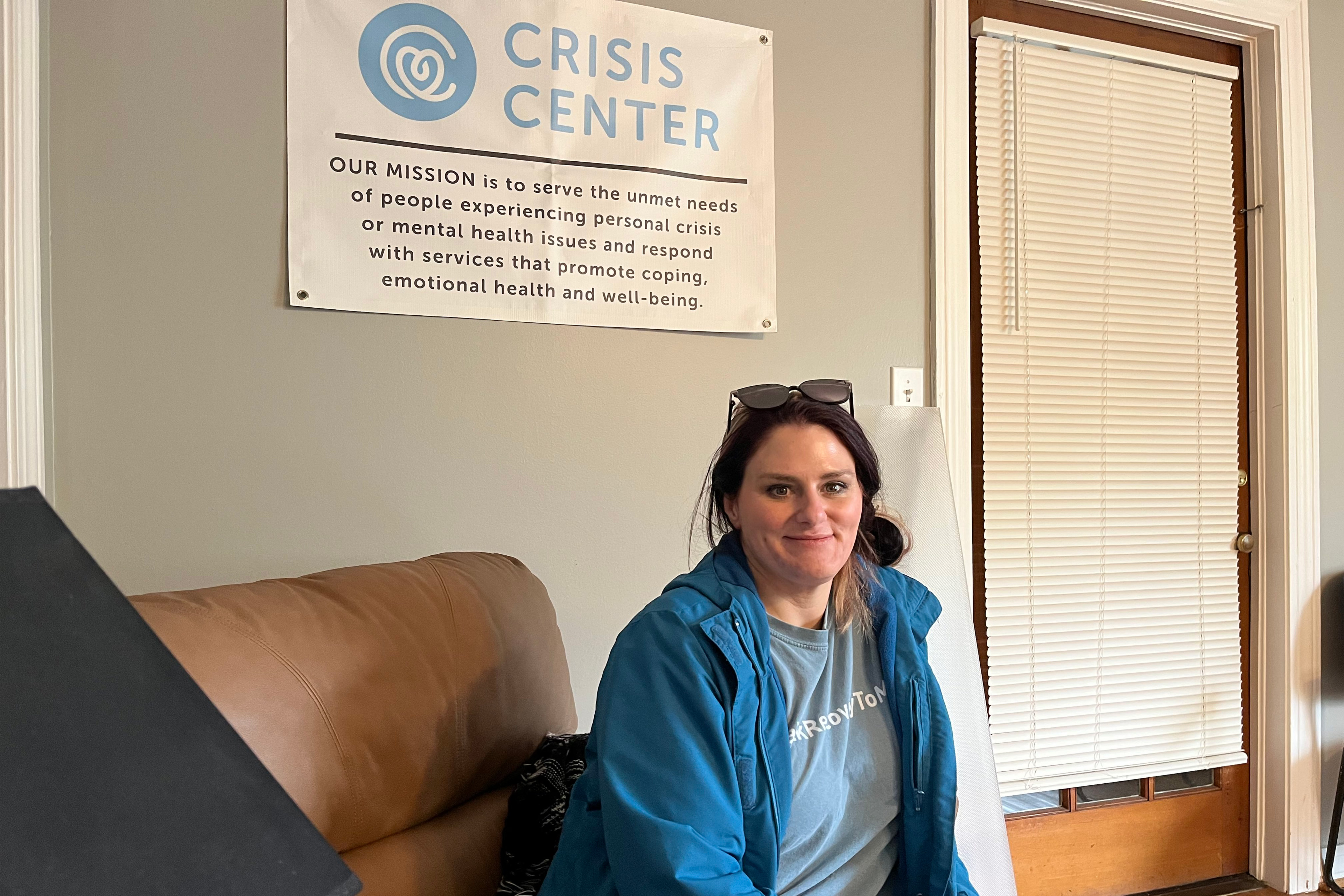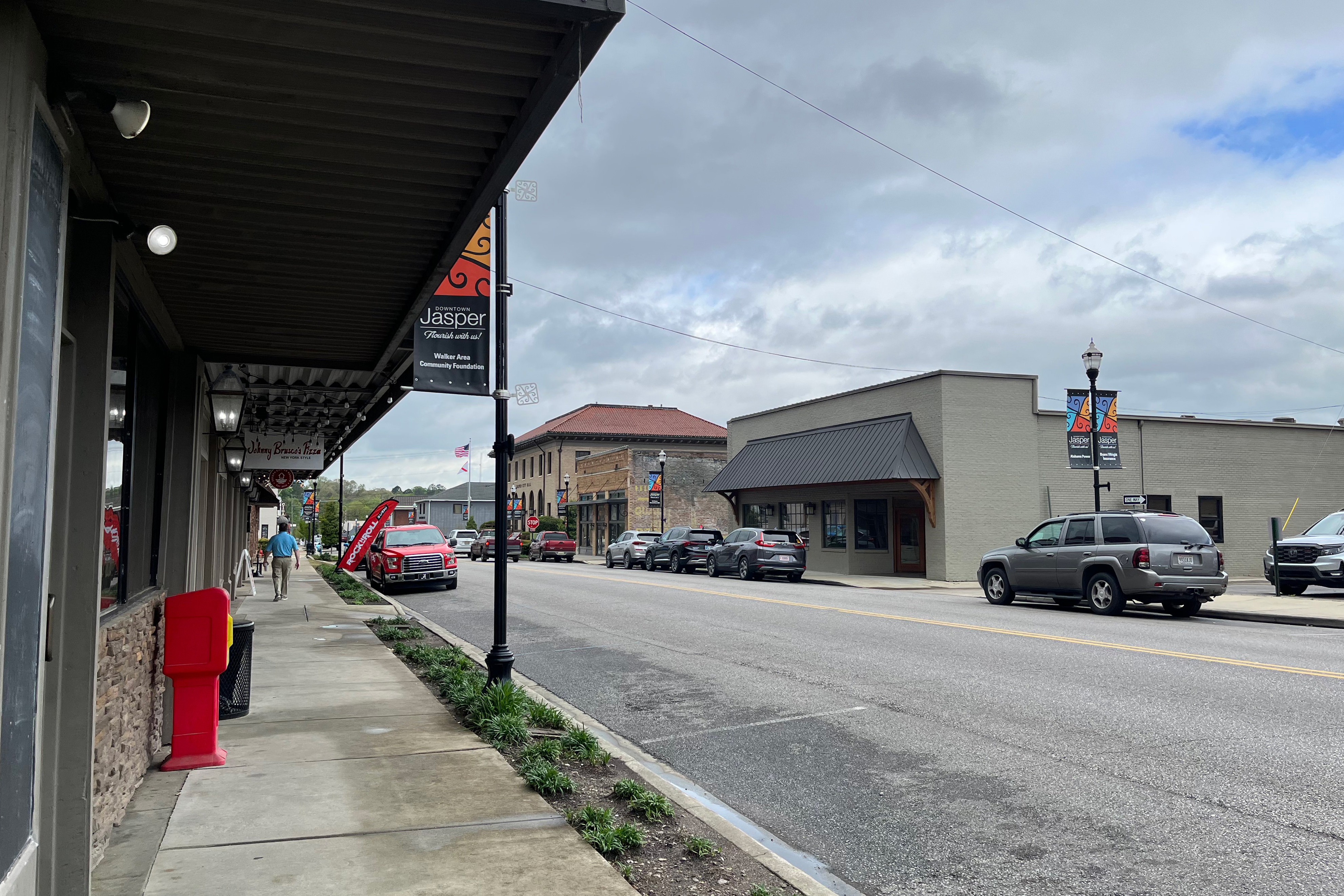This post was originally published on this site
JASPER, Ala. — Megan Dunn, who has struggled with addiction since her teens, points to the moment her life went “deeply downhill.”
After dropping out of high school, she gave birth at age 19 to a son she named Preston. Six weeks later, Dunn said, he died of sudden infant death syndrome.
“From then on, I went into this, like, PTSD, depression,” said Dunn, now 28.
Shortly after the baby’s death, Dunn said, she started using pain pills again. Eventually, she said, she was arrested on charges related to her illicit drug use, such as trespassing. She said she has had more than 30 stays in Walker County’s jail, a brick building in downtown Jasper. And each time, Dunn said, she was forced into drug withdrawal in her cell without medical care.
“I was literally praying to God to end me,” Dunn said about the pain and despair she felt.
People with drug addictions fill U.S. jails and are often left to endure withdrawal in concrete cells rather than in medical facilities. That’s especially true in Alabama, which has some of the toughest drug laws in the country. More than 5,000 people were arrested in Alabama on drug charges in 2021, and more than 90% of those were for possessing drugs rather than selling them, according to state data.
Dunn survived her stay in a holding cell in Walker County’s jail that’s known, she said, as the “drunk tank,” a concrete room that lacks water, a bed, or a toilet. Others have not.

In January, Anthony Mitchell, 33, allegedly froze to death after spending 14 days in the tank, according to a federal lawsuit his family filed in February against Sheriff Nick Smith, his deputies, and other jail employees.
Mitchell had “spiraled into worsening drug addiction,” the lawsuit said, and his cousin called 911 to send an ambulance to his home because Mitchell “appeared to be having a mental breakdown.” Instead, sheriff’s deputies arrived and then a SWAT team, the lawsuit said. On Facebook, the sheriff’s office posted that “Mitchell brandished a handgun” and, from the scene, a deputy published a photo of his arrest, the suit said.
In jail, Mitchell was “denied access to medical treatment,” the suit said, citing video footage from the jail, and he died in custody. His death has sparked a debate in Walker County about the treatment by law enforcement of people with addiction and mental illness.
Crime and Punishment: ‘People Are Scared to Say “I Need Help”’
Walker County, nestled in northwestern Alabama’s Appalachian foothills and dotted with coal mines, has one of the nation’s highest nonfatal overdose rates. The county was among the communities that pharmaceutical companies flooded with millions of pain pills in the 2000s. Addiction rates soared. Over time, people moved on to illicit drugs.
Walker County Sheriff Nick Smith, first elected in 2018, campaigned to keep his job in last year’s election, in which he was unopposed, by saying he’d “confronted the drug epidemic head on” by “taking criminals off the streets and putting them in jail where they belong.”
He also touted his drug arrests in a paid political announcement published in 2021 in the Daily Mountain Eagle, a newspaper in Jasper. He has deployed resources to boost the number of narcotics officers from two to five, and his staff has made about 2,500 drug arrests to date, Smith told KFF Health News.
Smith also said that his office helps people with addiction. It gives people a list of treatment resources when they’re released, he said, and has doubled medical supervision in the jail from eight to 16 hours a day.
Drug possession and distribution, Smith said, are crimes he’s tasked with enforcing. “We are going to do our job,” he said. With so many people addicted to illegal drugs in Walker County, the power of the sheriff’s office and threat of arrest loom large.

“People are scared to say ‘I need help,’” said Kayse Brown, who added that she faced down her own addiction and then became a certified peer support specialist to help others.
According to the lawsuit, a sheriff’s deputy allegedly told Mitchell’s cousin words to the effect of: “We’re going to detox him and then we’ll see how much of his brain is left.” No one checked his vitals or gave him the medication he needed, the lawsuit said. Within days, Mitchell was without a mat or blanket and “had to lie naked on the bare concrete floor,” the suit said.
When Mitchell arrived at Walker Baptist Medical Center two weeks after his arrest, his internal body temperature was 72 degrees Fahrenheit, the lawsuit said. That’s more than 20 degrees below what is considered “dangerously low,” according to the Mayo Clinic.
In response to the lawsuit, Smith and other defendants said that Mitchell was a “drug addict” who was “arrested in a psychotic and delusional state.” Court records show they don’t dispute what doctors reported about Mitchell’s condition in the medical records. But they deny most of the lawsuit’s other claims, including any liability for Mitchell’s death. They asked that the lawsuit be halted while the FBI and the state of Alabama consider filing criminal charges in the case, according to court records. A judge denied the request in June.
After Mitchell’s death, community activists called for Smith’s resignation, circulating a petition that has more than 4,000 signatures. Ryan Cagle, a pastor who started the petition, said the sheriff’s office doesn’t see addiction as a chronic condition. Instead, Cagle said, its officials shame people who use drugs by posting their mug shots and arrest details on Facebook.

“The people who are elected, the people who have the power, they do not see people suffering under substance abuse as human or worthy of dignity,” said Cagle, who runs a food pantry. Cagle’s brother is married to Brown. His father dealt with addiction, and earlier this year he lost a 20-year-old cousin to an overdose.
Smith wouldn’t comment on the Mitchell case because of the pending lawsuit and said that Dunn’s experiences happened before he took office. But, he said, “the burden of mental health is put on every sheriff in Alabama.” The shortage of mental health treatment and lack of early intervention means people who need help land in jail instead. In one case, he said, a person with mental health disorders faced an 18-month waiting list for space to open at the secure medical facility in Tuscaloosa.
Systemic Change Is Not Easy
Walker County’s challenges are indicative of those faced across the country. People with addictions often end up incarcerated, and Stephen Taylor, a Birmingham-based doctor and president-elect of the American Society of Addiction Medicine, points to a failure of the public health system to create a sustainable and robust addiction care infrastructure.
“We know what to do to treat addiction,” Taylor said in written testimony to a Senate subcommittee in May. But systemic change and disruption of the status quo is “exceptionally difficult,” he acknowledged.
Sources inside the system say that more than half of the people placed on the Alabama Department of Mental Health’s waiting list for residential substance abuse treatment either die, drop off the list, or end up incarcerated, according to a 2020 report from the Alabama Appleseed Center for Law & Justice, an advocacy group that says the state’s “prison system is broken.”
In Walker County, at least 2,800 people with a substance use disorder are not receiving treatment and existing treatment is limited, according to a September 2019 assessment conducted through a federally funded planning grant that helps rural communities respond to opioid overdoses.
Though treatment options are growing in the area, there are not enough to meet demand, some local recovery experts said. For example, the number of peer support specialists — those in recovery who are state-certified to help people before, during, and after treatment — increased to nine in 2022 from one in 2018, according to the Healing Network of Walker County, a group that organizes mental health and substance use-related resources in the county. A handful of providers offer medication-assisted treatment, including buprenorphine, which provides relief from severe symptoms of opioid withdrawal and, over time, reduces opioid cravings. A program now exists to help pregnant and parenting women experiencing addiction.
The need for more treatment services is especially acute in Alabama, one of 10 states that have not expanded Medicaid, which has provided insurance coverage to people with substance use disorders in other states.
“We operate the whole addiction system in a crisis mode, as opposed to looking at it over the long term,” said Regina LaBelle, director of the Addiction and Public Policy Initiative at Georgetown University. Law enforcement officials with no health care training exercise almost total authority over the lives of inmates with addiction, and they are more likely to view substance abuse as a crime to be punished than a health crisis to be treated, say academic researchers, reform advocates, and formerly incarcerated people.
“Right now, our system is still so focused on punishing people,” said Leah Nelson, research director at Alabama Appleseed.
Dunn said she felt continually harassed by law enforcement officials because she was known to be a drug user. Because she once missed the jail’s 4:30 a.m. breakfast call, she said, she was put in the same “drunk tank” where Mitchell spent his final days.
Smith said that he’s exploring the idea of treating people with addiction in Walker County’s jail with medications, but that the final decision rests with the county commission. Even though some people in county leadership disagree with the idea of treating people at the jail, “we’re at the point where all options are on the table,” he said.
“That is huge for Walker County,” said Nicole Walden, an associate commissioner at the Alabama Department of Mental Health. She has had initial conversations with the Walker County Sheriff’s Office about the idea. “The stigma around substance use, in the South, it is a lot worse. Alabama is very much a law-and-order state.”
Fewer than a fifth of U.S. jails, and just 13% in the South, start people on medications to treat opioid use withdrawal, according to a U.S. Department of Justice report published in April. Only one Alabama jail currently offers medication-assisted treatment, Walden said.
Dunn checked into residential treatment outside the county about six times. Each time she relapsed. Eventually, after missing court dates and once trying to escape from jail, Dunn ended up in prison for nearly two years, where, she said, “drugs were everywhere.”

The Long Road to Recovery
Nationally, police arrested more than a million people for drug possession in 2020. U.S. courts and police departments tasked with treating addiction have mixed results.
“Jails are not the most ideal place to treat them, but it’s the reality of where they end up,” said Andrew Klein, senior scientist for criminal justice at Advocates for Human Potential, a social services advocacy organization.
The Walker County Sheriff’s Office runs a program to help people find treatment. But it’s limited to those without an outstanding arrest warrant and with no more than two drug convictions, so few residents who are in need qualify. In its first two years, 20 people completed some sort of addiction treatment, according to the September 2019 assessment.
Nikki Warren benefited from the county drug court program, which requires participants to take drug tests and pay thousands of dollars in fees. Warren joined the program at the recommendation of a judge. She was arrested in 2018 after she blacked out when she mistakenly took fentanyl instead of heroin.
“I needed that wake-up call,” said Warren, who is now an outreach supervisor at Recovery Organization of Support Specialists. After completing the program, her charges were dismissed, she said.
Dunn said the drug court program was “too hard.” But she was released from prison 3½ years ago determined to change her life. She recalled thinking to herself, “Dang, girl, all them years that I wasted.”
She spends time reading the Bible and singing, she said, but has struggled to find stable footing. She has lost several friends to overdoses, she said. Dunn said she would like to see a counselor but is uninsured. She relapsed for about a week this year, she said. She wants to work, perhaps at the front desk of a factory, but she goes to job interviews with a felony record and no high school diploma.
“Here I am — I quit school, my baby is dead,” Dunn said. She feels she is still being punished by the system. “I’m not perfect,” she said. But “they don’t give us a chance.”

Kara Nelson of KFF Health News contributed to this report.
This article was produced by KFF Health News, formerly known as Kaiser Health News (KHN), a national newsroom that produces in-depth journalism about health issues and is one of the core operating programs at KFF — the independent source for health policy research, polling, and journalism.
